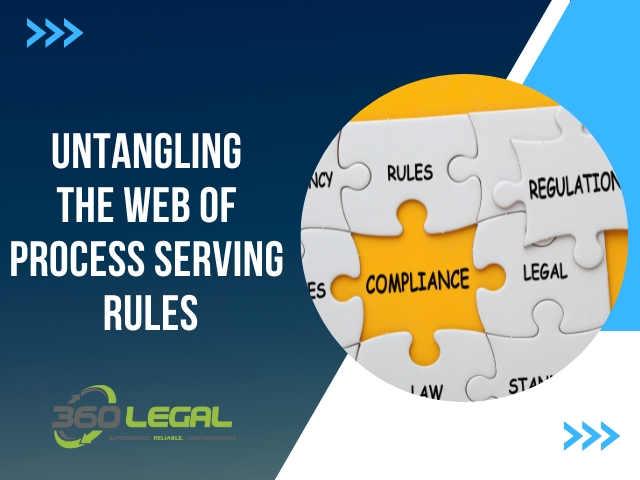Testing RSS Feeds.. ignore post.
Testing RSS Feeds.. ignore post.
Untangling the Web of Process Serving Rules

Process serving, an essential aspect of civil law proceedings, involves delivering legal documents to the parties involved in a lawsuit. This crucial task surrounds an intricate web of laws and regulations that ensure due process. This article attempts to untangle the complex web of process serving rules, highlighting the importance of understanding these regulations to ensure a smooth and effective legal procedure.
The Fundamental Importance of Rules in Process Serving
Serving legal documents is integral to maintaining the legal process’s transparency, fairness, and justice. Rules regarding process safeguard individuals’ rights to be informed of legal actions involving them and present their cases if they wish. Moreover, adherence to these rules ensures the validity of service, the absence of which can lead to unnecessary delays, case dismissals, or an unfair trial.
The Complexity of Process Serving Rules
Process serving rules are not uniform guidelines but vary across different jurisdictions. These rules encompass who can help with legal documents, when and where they can be done, and the service method. Additionally, different types of cases may necessitate specific process serving rules. Therefore, understanding this complex web of regulations is vital for successful service.
Who Can Serve: The Rule of Disinterested Party
In process serving, a disinterested party refers to an individual who has no personal interest or stake in the case’s outcome and is not related to or affiliated with any of the parties involved, ensuring an unbiased and impartial delivery of legal documents. Generally, any adult over 18, who is not a party to the case, can serve legal papers and become a process server. In Florida, a process server requires adherence to specific rules and regulations that govern this essential role within the legal system. These guidelines ensure that process servers operate with integrity, professionalism, and a thorough understanding of the legal process. However, many states prefer, or even mandate, that a professional process server or law enforcement officer perform this task. The aim is to ensure an unbiased delivery, minimizing the chances of disputes or misconduct. Understanding this rule is critical to preventing invalid service, which could undermine the entire legal proceeding.
When and Where: Rules of Timing and Location
Rules of Process serving also dictate the timing and location of process servicing. Serving papers at a person’s residence usually requires it to be done during reasonable hours. Some jurisdictions prohibit service on Sundays or holidays. Depending on the jurisdiction, serving at specific locations, such as a person’s workplace, might be restricted. Familiarity with these rules is crucial to avoiding infringing on an individual’s rights or privacy.
There may also be restrictions on serving papers in public places where privacy could be an issue. Failure to comply with these rules can lead to delays in legal proceedings, or even dismissal of the case if the service is improper. Therefore, professional process servers like 360 Legal invest heavily in training their staff, familiarizing them with the varying regulations across different jurisdictions, and leveraging technology to document each service accurately. Their rigorous adherence to these rules ensures that the legal process moves forward smoothly and ethically without compromising the rights or privacy of the individuals involved.
The Method of Service: Personal, Substitute, and Constructive Service
The rules delineate several service methods: personal, substitute, and constructive.
1. Personal service: Which involves delivering the papers directly to the person, is preferred in many jurisdictions because it ensures the person is aware of the legal action. This method is highly regarded because it leaves no doubt that the person has received notice. Specialized process servers or law enforcement officers typically perform personal service to ensure proper execution and adherence to jurisdictional guidelines.
2. Substitute service: Is employed when personal service is unsuccessful after numerous attempts. It involves leaving the documents with someone at the intended person’s residence or mailing the papers to their home. This method usually requires specific procedures and conditions, such as making several attempts at personal service before resorting to the substitute method. Some jurisdictions may demand evidence of these attempts or require a notice to be prominently posted on the main entrance of the individual’s residence. This method involves a level of risk, as it might be challenged in court if not carried out meticulously.
3. Constructive service or “service by publication”: Is a last resort when the person cannot be located after a diligent search. It involves publishing the notice in a local newspaper. A court must typically approve constructive service, and it’s often required that an affidavit detailing all attempts to locate the individual be submitted. The notice must be published in a newspaper of general circulation within the jurisdiction where the legal action is taking place, often for a specified number of weeks. Some jurisdictions might also require mailing a copy of the notice to the individual’s last known address. This method is usually seen as a last resort due to its indirect nature and the potential difficulty in ensuring that the party involved becomes aware of the proceedings.
Each method has its own set of rules regarding when it can be employed and how it should be executed. Missteps can lead to ineffective process service and potential legal consequences.
Electronic Service and it’s Evolving Rules
The digital age has introduced electronic service of process (eService), where legal documents are served via email or other digital methods. While eService offers the potential for faster and more efficient service, it also presents new challenges, such as confirmation of receipt and identity verification. Still, technology advances have helped with these issues.
360 Legal’s 360 TotalView™ an industry-leading client portal, which provides real-time updates, custom reporting, and comprehensive case management across various platforms, all tailored to meet clients’ needs for efficient service initiation, cost management, and compliance monitoring, whether from the Cloud, Desktop, or Mobile.
The Role of Professional Process Servers
Given the complex nature of process serving rules, professional process servers play a critical role. With their thorough understanding of the legal landscape, they can navigate the nuances of these regulations effectively. Their expertise minimizes the risk of mistakes that could jeopardize the legal proceedings.
Conclusion
The web of process serving rules, intricate as it may be, is crucial for upholding the principles of justice and fairness. While sometimes daunting, these rules protect individuals’ rights and ensure the legal process runs smoothly. As process serving continues to evolve in the face of societal and technological changes, so will the rules that govern it. Whether a seasoned law professional or a citizen is involved in a legal matter, understanding these rules is crucial in navigating the legal process. It truly is a case of the more tangled the web, the more there is a need to understand and untangle it.
Author
We are Social!
Latest tweets
Popular Tags
Testimonials
"5 star service ! prompt serving, helpful, professional . "
"Mike is awesome. Our firm has hired him on several occasions and we are very happy with his work. His prompt serving, helpful, professional and always in communication. I recommend him highly! "
"360Legal provides speedy and easy to use Process Service that is flexible, and very transparent with nearly instant reporting. It is very helpful for us to be able to track the status of our process service jobs, especially when they are time sensitive. "
Latest News
-

RMAI 2021 Annual Conference RMAI Annual Conference
April 12-15, 2021 -

NATIONAL CREDITORS BAR ASSOCIATION 2020 SPRING CONFERENCE
May 19-21, 2021 -

ALFN ANSWERS 2021
Jul 18-21, 2021 -

Annual Convention and Expo
Oct. 17-21, 2021 -

Florida Association of Professional Process Servers 33rd Quarter Board Meeting/Professional Beach Getaway
Aug. 20-22, 2021












